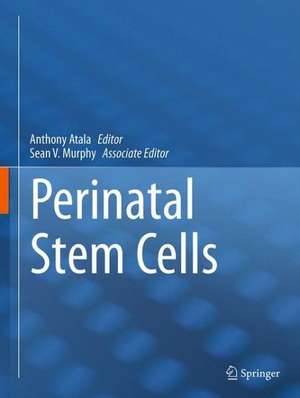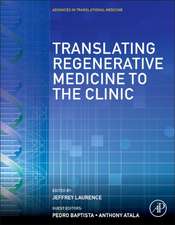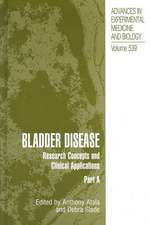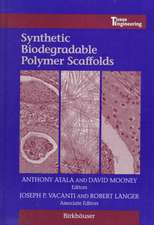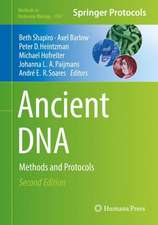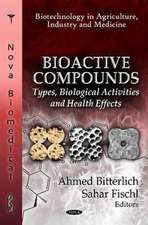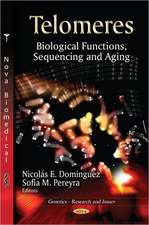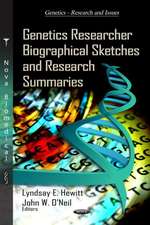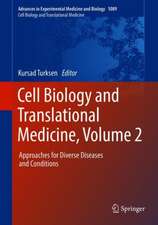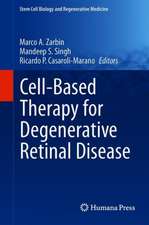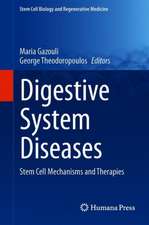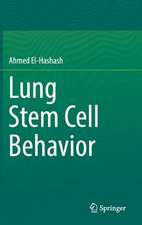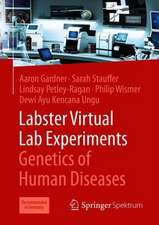Perinatal Stem Cells
Editat de Anthony Atala, Sean V. Murphyen Limba Engleză Hardback – 29 aug 2014
Perinatal Stem Cells contains thirty-two chapters written by internationally recognized leaders in stem cell research. It is organized into four sections covering amniotic fluid stem cells, placental and placental membrane stem cells, umbilical cord stem cells, and clinical translation. This cohesive structure provides an effective framework for detailed insight into this new frontier. Edited by Dr. Anthony Atala, one of the foremost experts in the field, and his co-editor Dr. Sean V. Murphy, this volume is a definitive work for stem cell research and its future implications. It is a key resource for all stem cell researchers, clinicians, and government and industry staff working in this dynamic and exciting field.
| Toate formatele și edițiile | Preț | Express |
|---|---|---|
| Paperback (1) | 809.98 lei 38-44 zile | |
| Springer – 22 sep 2016 | 809.98 lei 38-44 zile | |
| Hardback (1) | 981.28 lei 22-36 zile | |
| Springer – 29 aug 2014 | 981.28 lei 22-36 zile |
Preț: 981.28 lei
Preț vechi: 1196.67 lei
-18% Nou
Puncte Express: 1472
Preț estimativ în valută:
187.76€ • 196.57$ • 155.37£
187.76€ • 196.57$ • 155.37£
Carte disponibilă
Livrare economică 17-31 martie
Preluare comenzi: 021 569.72.76
Specificații
ISBN-13: 9781493911172
ISBN-10: 1493911171
Pagini: 373
Ilustrații: XXIII, 373 p. 101 illus., 87 illus. in color.
Dimensiuni: 210 x 279 x 22 mm
Greutate: 1.47 kg
Ediția:2014
Editura: Springer
Colecția Springer
Locul publicării:New York, NY, United States
ISBN-10: 1493911171
Pagini: 373
Ilustrații: XXIII, 373 p. 101 illus., 87 illus. in color.
Dimensiuni: 210 x 279 x 22 mm
Greutate: 1.47 kg
Ediția:2014
Editura: Springer
Colecția Springer
Locul publicării:New York, NY, United States
Public țintă
ResearchCuprins
1 Amniotic Fluid Stem Cells for Cardiac Regeneration.- 2 Amniotic Fluid Stem Cells for Wound Healing .- 3 Treatment of Necrotising Enterocolitis (NEC) with Amniotic Fluid Stem Cells.- 4 Therapeutic Application of Amniotic Fluid Stem Cells for Graft-versus-Host Disease.- 5 Amniotic Fluid Stem Cell Features Supporting their Putative Role in Fetal Cell Microchimerism.- 6 Amniotic Fluid Stem Cell Therapy for Lung Disease.- 7 Direct Reprogramming of Amniotic Cells into Endothelial Cells.- 8 Amniotic Fluid Stem Cells for the Treatment of Articular Cartilage Defects.- 9 Amniotic Fluid-Derived Cells: An Autologous Cell Source for Cardiovascular Tissue Engineering.- 10 Amniotic Fluid Stem Cells for Bone Tissue Engineering.- 11 Amniotic Fluid Stem Cells for the Repair of Prenatal and Perinatal Defects.- 12 Stimulation of Therapeutic Angiogenesis Using Amniotic Fluid Stem Cells.- 13 Placental Stem/Progenitor Cells: Isolation and Characterization.- 14 Treatment of Liver Disease using Placental Stem Cells: Feasibility of Placental Stem Cells in Liver Diseases: Potential Implication of New Cell Therapy-Based Strategies for Hepatic Diseases.- 15 The Human Term Placenta as a Source of Transplantable Hematopoietic Stem Cells.- 16 Placental Stem Cells for Cartilage Tissue Engineering.- 17 Mesenchymal Stem Cells from Human Amniotic Membrane.- 18 Bladder Reconstruction Using Amniotic Mesenchymal Stem Cells.- 19 Amnion Epithelial Cells for Lung Diseases.- 20 Potential Efficacy of Amnion Epithelial Cells to Treat Post-Stroke Inflammation.- 21 The Potential of Human Amnion Epithelial Cells as an Immunomodulatory and Neuroregenerative Treatment for Multiple Sclerosis.- 22 Human Amniotic Epithelial Cells Transplantation for Contusive Spinal Cord Injury Repair.- 23 Therapeutic Potential of Amnion Epithelial Cells for Diabetes.- 24 Collection, Processing & Banking of Umbilical Cord Blood.- 25 Umbilical Cord Blood Cells in the Repair of Central Nervous System Diseases.- 26 Umbilical Cord Blood for Cardiovascular Cell Therapy.- 27 Bone Regeneration using Wharton's Jelly Mesenchymal Stem Cells.- 28 Wharton's Jelly Mesenchymal Stem Cells for the Treatment of Type 1 Diabetes.- 29 Umbilical Cord Blood-Derived Endothelial Progenitor Cells for Cardiovascular Tissue Engineering.- 30 Manufacturing Perinatal Stem Cells for Clinical Applications.- 31 Towards Clinical Applications of Umbilical Cord Derived Mesenchymal Stem Cells.- 32 Recent Patents on Perinatal Stem Cells.
Recenzii
From the book reviews:
“This book would be an excellent resource for graduate students in the field of perinatal stem cells. Other researchers in the stem cell field (postdocs, PIs) may also benefit. … This book offers a comprehensive overview and review of the use of perinatal stem cells in both the clinical and preclinical settings. It is essential for students and postdocs studying perinatal stem cells.” (Ellen Mary Andrews, Doody’s Book Reviews, January, 2015)
“This book would be an excellent resource for graduate students in the field of perinatal stem cells. Other researchers in the stem cell field (postdocs, PIs) may also benefit. … This book offers a comprehensive overview and review of the use of perinatal stem cells in both the clinical and preclinical settings. It is essential for students and postdocs studying perinatal stem cells.” (Ellen Mary Andrews, Doody’s Book Reviews, January, 2015)
Notă biografică
Dr. Anthony Atala is widely recognized as a true groundbreaker in stem cell research and regenerative medicine. He led the team that grew the first lab-grown organ to be implanted into a human. Aside from being involved in many of the field’s top journals, he has devoted the last several decades of his career to the development of sustainable organs grown from a patient’s own stem cells – technology that has the potential to solve the problem of patients dying while waiting for organs as well as the common organ transplant complication of rejection. Dr. Atala received a bachelor’s degree in psychology from the University of Miami and his medical degree from the University of Louisville, where he completed his residency in urology. While a Fellow at Harvard Medical School, he trained with renowned pediatric urologic surgeons and eventually became Director of the Laboratory for Tissue Engineering and Cellular Therapeutics at Children's Hospital Boston, where his work involved the growing of human tissue and organs to replace those damaged through disease or defect. After that, Dr. Atala moved to Wake Forest, and it was there that he and his team developed the lab-grown bladder that was implanted in a human. A prolific author and editor of journal articles and books, Dr. Atala is the recipient of multiple awards and patents, presented an ovation-receiving TED lecture, and has been featured on 60 Minutes. His accomplishments also include being ranked as the 56th most influential person of the year in a Time Magazine poll and being ranked by Esquire Magazine as one of the 75 most influential persons of the 21st century.
Dr. Sean V. Murphy received his Ph.D. from Monash University, Melbourne, Australia and is currently a Research Fellow at the Wake Forest Institute for Regenerative Medicine in North Carolina, USA. His research focuses on the clinical application of perinatal cells and tissues for the treatment of injury and disease. Dr. Murphyhas received numerous awards and fellowships, most notably an American Lung Association Senior Research Training Fellowship, and an American Australian Association Sir Keith Murdoch Fellowship. Dr. Murphy is Director/Secretary and Founder of the International Perinatal Stem Cell Society, Chair of the Scientific & Professional Development Committee for the Tissue Engineering and Regenerative Medicine International Society (TERMIS) and serves on the editorial board of multiple international journals.
Dr. Sean V. Murphy received his Ph.D. from Monash University, Melbourne, Australia and is currently a Research Fellow at the Wake Forest Institute for Regenerative Medicine in North Carolina, USA. His research focuses on the clinical application of perinatal cells and tissues for the treatment of injury and disease. Dr. Murphyhas received numerous awards and fellowships, most notably an American Lung Association Senior Research Training Fellowship, and an American Australian Association Sir Keith Murdoch Fellowship. Dr. Murphy is Director/Secretary and Founder of the International Perinatal Stem Cell Society, Chair of the Scientific & Professional Development Committee for the Tissue Engineering and Regenerative Medicine International Society (TERMIS) and serves on the editorial board of multiple international journals.
Textul de pe ultima copertă
This comprehensive volume is one of the first books to offer the reader detailed insight into sources of perinatal stem cells, their biology, and their potential for disease treatment. It examines the research and therapeutic applications of perinatal stem cells including the treatment of renal disease, hematopoietic regeneration, cardiac disease, inflammatory disease, bone regeneration, pulmonary disease, and the treatment of spinal cord injury. Further, the book discusses current progress in the manufacturing, banking and clinical translation of perinatal stem cells. Through this book, readers will gain a thorough understanding of the current pre-clinical and clinical applications of perinatal stem cells as well as the efforts to support the transition of perinatal stem cell therapies from laboratories to clinics.
Perinatal Stem Cells contains thirty-two chapters written by internationally recognized leaders in stem cell research. It is organized into four sections covering amniotic fluid stem cells, placental and placental membrane stem cells, umbilical cord stem cells, and clinical translation. This cohesive structure provides an effective framework for detailed insight into this new frontier. Edited by Dr. Anthony Atala, one of the foremost experts in the field, and his co-editor Dr. Sean V. Murphy, this volume is a definitive work for stem cell research and its future implications. It is a key resource for all stem cell researchers, clinicians, and government and industry staff working in this dynamic and exciting field.
Perinatal Stem Cells contains thirty-two chapters written by internationally recognized leaders in stem cell research. It is organized into four sections covering amniotic fluid stem cells, placental and placental membrane stem cells, umbilical cord stem cells, and clinical translation. This cohesive structure provides an effective framework for detailed insight into this new frontier. Edited by Dr. Anthony Atala, one of the foremost experts in the field, and his co-editor Dr. Sean V. Murphy, this volume is a definitive work for stem cell research and its future implications. It is a key resource for all stem cell researchers, clinicians, and government and industry staff working in this dynamic and exciting field.
Caracteristici
Explores current clinical and pre-clinical application of stem cells derived from perinatal sources Offers detailed insight into sources of perinatal stem cells and their potential for disease treatment Discusses progress in the manufacturing, banking and clinical translation of perinatal stem cells Includes supplementary material: sn.pub/extras
